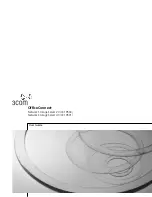
PCMCIA SOFTWARE (DOS/WINDOWS3.X) INFORMATION
If you have installed the PCMCIA software, such as SystemSoft’s CardSoft
or Databook’s Cardtalk, then EXPHDG.EXE will call these PCMCIA software
to enable the card. If you don’t have one, EXPHDG.EXE still can directly
access your hardware to enable the card. In this case, your computer should
have an Intel 82365SL Personal Computer Interface Controller (PCIC) or
another compatible controller.
PCMCIA software contains several components: Socket services, Card
services, Resource Initialization Utility and Card Installation Utility. The
remainder of this section will explain the four components and list the device
driver names for the major PCMCIA software.
Socket Services provide the interface between a system’s BIOS and the
host controller chips (such as the Intel 82365SL PCIC, Vadem 468, etc )
Socket Services includes functions such as configuring a socket for an I/O or
memory interface and controlling socket power voltages. The Socket
Services driver you have varies with the host computer chip of your
computer.
Card Services provides the interface between the PC Card and the PCMCIA
sockets. Card Services must be aware of the I/O, IRQ, and memory
resources already used by the system so it can accurately assign unused
resources to the PC Cards.
To ensure Card Services will operate reliably regardless of the system it is
installed on, some PCMCIA software provides its own resource initialization
utility, which will check I/O ports, IRQs, and memory addresses and then
report that information to Card Services.
The Card Installation Utility detects the insertion and removal of PC cards,
and automatically determines the card type upon insertion so the card and
socket will be configured properly.
The device driver names of the major PCMCIA software are listed below:
Software/Device
Driver
SystemSoft
CardSoft
Phoenix
Award
Cardware
IBM
ThinkPad
Socket Services
SS365SL.EXE,
SS365LP.EXE,
SSCIRRUS.EXE,
SSDBOOK.EXE,
SVADEM.EXE,
SSVLSI.EXE
PCMSS.EXE
SSPCIC.EXE
IBMDSS02.SYS
Card Services
CS.EXE
PCMCS.EXE
PCCS.EXE
IBMDOSCS.SYS
Resource
Initialization Utility
CSALLOC.EXE
PCMRMAN.SYS
PCRM.EXE
DICRMU02.SYS
IDE/ATA Driver
ATADRV.EXE
PCMATA.SYS
SRAM Card Driver
MTSRAM.EXE
Flash Card Support
MTAA.EXE,
MTAB.EXE,
MTI1,EXE
MTI2P.EXE
Memory Card
Driver
MEMDRV.EXE
Card Installation
Utility
CARDID.EXE
PCMSCD.EXE
PCENABLE.EXE
AUTODRV.SYS
Card Services Power
Management
CS_APM.EXE
$ICPMDOS.SYS
If you are not sure which PCMCIA software you are using, you may check it
by typing
TYPE CONFIG.SYS
at the DOS prompt followed by the ENTER key.
The file should come up and look like one of the following examples.

































